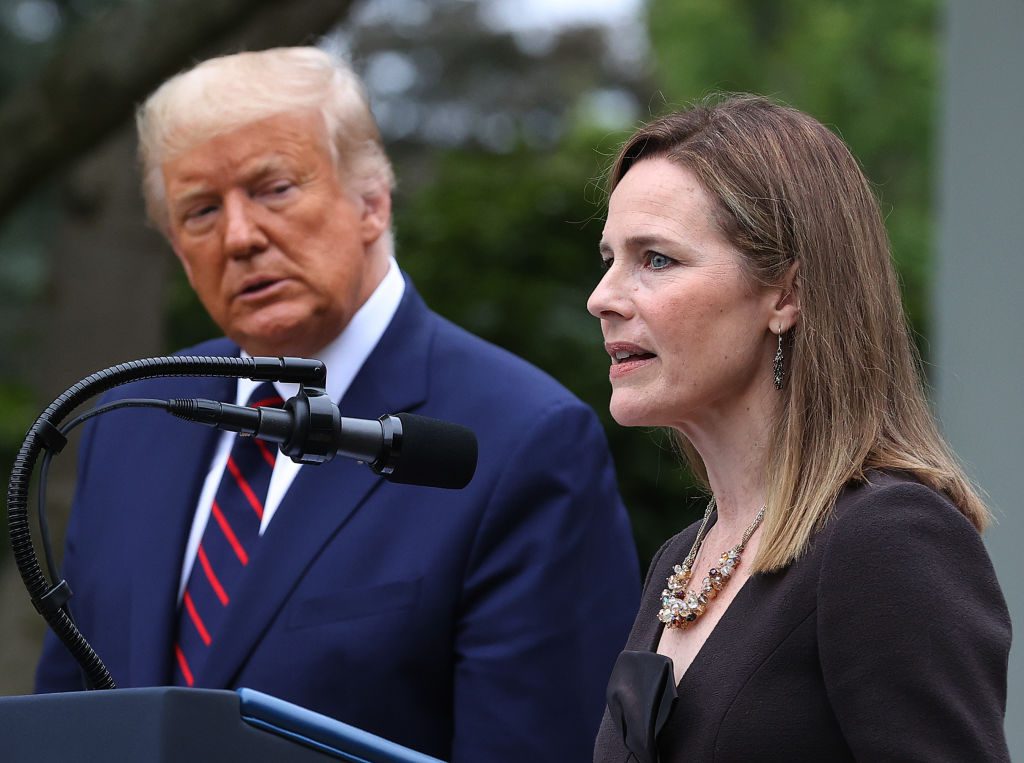Roe v. Wade in the Crosshairs? Not so Fast

The trumpets have sounded; the applause has died down. Amy Coney Barrett has been nominated by Donald Trump to the Supreme Court. Conservatives, including myself, are gearing up for a fight, one that can’t be ducked and whose subtext isn’t Barrett herself so much as legal abortion. Yet amid all the gut-checking and muscle-flexing, it’s worth stepping back and taking a look at the decades-long quest to repeal Roe v. Wade.
Because even with a Justice Barrett, the goal is far from guaranteed.
For perspective, let’s travel back to 1987. The Reagan White House was beleaguered. They’d just watched two of their Supreme Court nominations fail, first Robert Bork, who had been slandered by Ted Kennedy and then talked his way to defeat during his confirmation hearings, and then Douglas Ginsburg, withdrawn after he’d admitted to smoking marijuana (saints preserve us!). With an election year looming, the president was eager to put all the judicial jujitsu behind him. And so he tried again, this time nominating Judge Anthony Kennedy, whom he said “seems to be popular with many senators of varying political persuasions.”
Today, Kennedy is remembered by conservatives as the biggest Supreme Court disappointment since David Souter, a defender of abortion rights, his legal thinking a cream puff of feel-good liberalism. Yet he wasn’t necessarily regarded that way at the time. Kennedy was clearly cautious, lacking the flaming opinions of a Robert Bork. But that didn’t stop the president of the American Conservative Union from predicting, “When the dust settles, people will regard this as a good choice.” There was also plenty of fire from the opposite direction. According to congressional testimony from Kate Michelman, then the executive director of the National Abortion Rights Action League:
Much like Robert Bork, Kennedy aims his criticisms not at social injustice but at modern civil rights law; in his words, “judicial power without rational restraints is simply the exercise of raw will, the arrogance of power.” In practice, this rejection of what he calls “judicial activism” has amounted to an abdication of judicial responsibility to protect individual rights. Because for women reproductive freedom is an essential guarantor of all other rights and liberties, the National Abortion Rights Action League finds Anthony Kennedy a deeply disturbing candidate for the United States Supreme Court.
You would have thought Franco had absconded to Sacramento and had a baby with Joe McCarthy.
Again, it is possible to discern these things to a point. Bork was always more likely to blow up Roe than Kennedy was, as is Clarence Thomas for that matter. But the crystal ball is still foggy. The problem is that Roe—and its accompanying right-to-privacy decisions like Griswold v. Connecticut and Lawrence v. Texas—were not judicial rulings so much as legislation, the justices inflicting their own preferences on the country, leaning on a gibberish “penumbra” as rationale. Conservatives counter that their approach is different. They want originalists and textualists who interpret the law as it reads, not through the prism of their own whims. The liberal approach they consistently and accurately denounce as “legislating from the bench.”
But if your aim is to repeal legislation, then you need to think legislatively. Thus do we find conservatives assessing judges like Amy Coney Barrett based on her “abortion record,” which is to say her previous rulings and opinions and comments. But the circumstances of those rulings and opinions and comments differ case by case, inevitably taking into account other facets of the law: various statutes, the Constitution, stare decisis. It isn’t all about abortion qua abortion. Justices may have always been political, as Hunter DeRensis writes today, but they’ve never been intended to be legislative. Their job is fundamentally different, their thinking both more narrow and more complex. And that’s the great frustrating paradox facing pro-lifers: they must think legislatively about justices who themselves think judicially, all to throw out a piece of legislation passed by a judiciary.
I sometimes think Donald Trump could stay in office for the next 35 years, replace all three liberal justices and John Roberts, and abortion would still be upheld six to three. That, of course, is probably too cynical. Again, we can discern these things to a point, and Barrett is more likely to strike down Roe than, say, the perpetually shore-hugging Roberts. Still, we should remember Barrett’s own words from 2013: “I think it is very unlikely at this point that the court is going to overturn [Roe]. …The fundamental element, that the woman has a right to choose abortion, will probably stand.” That isn’t some kind of policy statement that should be used against her; it’s just a realistic appraisal of how the judiciary works.
Let’s fight like hell to get her on the Court. But let’s acknowledge, too, the half-court shot nature of it all—and the reason why Roe is such an abomination of law in the first place.